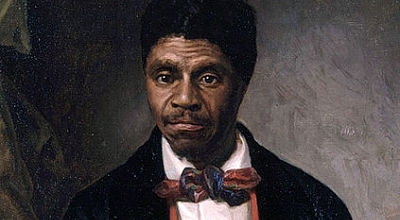Dred Scott–even his extraordinary names snaps with intensity–was a slave who didn’t want to be a slave. He offered to purchase his freedom in 1842, but his mistress refused. He then did something a black man simply was not supposed to do: In 1846, he filed suit.
Having lived with his wife in two states that prohibited slavery, Scott argued that he and his wife were, and should be declared legally, free. His case worked its way through the court system until on March 6, 1857, the U.S. Supreme Court. And here, in part, is what Chief Justice Roger Taney wrote about Mr. Scott’s efforts to experience the liberties, including liberty of person, we now take for granted. At the time of the drafting of the Constitute, said the Justice, persons of African heritage were seen as “… beings of an inferior order, and altogether unfit to associate with the white race, either in social or political relations, and so far inferior that they had no rights which the white man was bound to respect.”
Thus, although the Constitution presupposes the Declaration of Independence’s assertion that “all men are created equal,” it does not confer such equality of African-Americans. Indeed, given that slavery was permitted at the time of the Declaration itself, Mr. Taney argued that the Founders themselves believed blacks were not “men.”
Of course, this specious argument assumes that the political philosophy endorsed by the Founders in the Declaration found its way without hindrance into the laws of the United States, including those involving slavery. This is ludicrous: To assert and affirm a moral truth is not the same as practicing it, and the Founders knew it. Even slaveholder Thomas Jefferson acknowledged in his “Notes on the State of Virginia” that to assert that the worst white man was better than the finest black man was nonsense.
It’s also worth noting that Justice Taney was not above what we today would call “playing the race card.” He wrote of what was, to some whites, the shudder-inducing prospect of black Americans going where they wanted to: “[Freedom] would give to persons of the negro race, … the right to enter every other State whenever they pleased, … to sojourn there as long as they pleased, to go where they pleased … the full liberty of speech in public and in private upon all subjects upon which its own citizens might speak; to hold public meetings upon political affairs, and to keep and carry arms wherever they went.”
To suggest that persons of African heritage do not possess, nor should exercise, these rights breaks hard on the ear of decency. Sadly, many Americans in the 1850s were morally deaf, and, thus, the Civil War came.
In commenting on Justice Taney’s ruling, Abraham Lincoln said that the Justice did “obvious violence” to the Declaration of Independence. Read Lincoln’s words; the relentless force of his reason and moral indignation still stirs the soul: “They [the Founders] defined with tolerable distinctness, in what respects they did consider all men created equal – equal in ‘certain inalienable rights, among which are life, liberty, and the pursuit of happiness.’ This they said, and this meant … they meant to set up a standard maxim for free society, which should be familiar to all, and revered by all; constantly looked to, constantly labored for, and even though never perfectly attained, constantly approximated, and thereby constantly spreading and deepening its influence, and augmenting the happiness and value of life to all people of all colors everywhere.”
All Christians should affirm that “all people of all colors everywhere” are made in the image and likeness of God and merit the rights He has bestowed and which government has been charged with safeguarding–and also that racial equality has not been “perfectly attained,” as Lincoln put it. For such attainment all believers should continue to work.
Should we not also affirm that God-given rights extend to all persons, regardless of gestational state, size, physical formation, intellectual development, or capacity for self-sustenance? And should we not awaken the morally deaf, humbly but insistently, however much they resist honor’s voice?
What changes at the time of birth is not the humanness of the person but his or her place of residence: For nine months, the person is living and growing within his or her mother’s womb. For the rest of that person’s existence, life is lived outside the womb. Science and logic vindicate this proposition. The “law written on the heart” (Romans 2:14), “the laws of nature and of nature’s God,” do as well.
That’s why whether through the courts, legislation, or regulation, through pregnancy care centers, adoption, homes opened to women in crisis pregnancies, sound pre-natal care and simple kindness, Christians should always seek to protect the unborn and their mothers and welcome them into all the fullness of life.
I can’t help but think that Dred Scott would have agreed.
Rob Schwarzwalder is senior vice president at Family Research Council. This article appeared in Religion Today on March 7, 2013.
See an error in this article?
To contact us or to submit an article





















